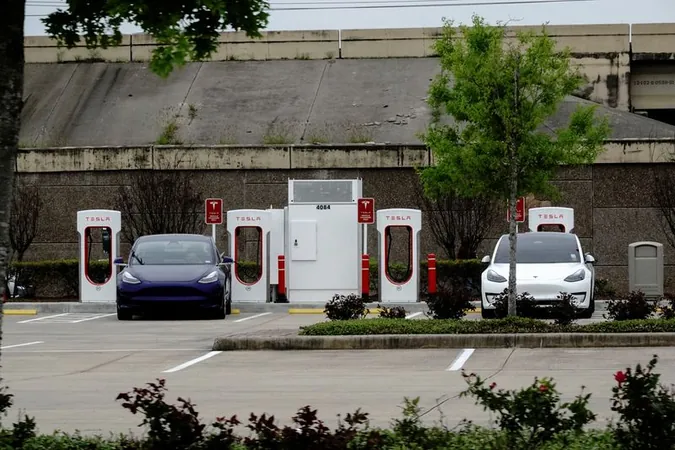
Are We Witnessing the End of EV Tax Credits? Trump’s Transition Team Seeks to Scrutinize Biden's Incentives!
2024-11-15
Author: Emma
Introduction
President-elect Donald Trump's transition team is contemplating the elimination of the $7,500 consumer tax credit for electric vehicle (EV) purchases, according to multiple sources familiar with the discussions. This move is part of a broader tax reform effort that could significantly impact the already slow transition to electric vehicles in the United States.
Tesla's Support
Interestingly, it has come to light that Tesla, the leading U.S. EV manufacturer, has indicated support for the removal of this subsidy. While Tesla CEO Elon Musk acknowledged that this decision could marginally dent Tesla's sales, he stated it would be "devastating" for its competitors, particularly legacy automakers like General Motors (GM). This could mark a pivotal shift in the EV market landscape where new players struggle against established giants like Tesla.
Market Reaction
Following these revelations, shares of major EV companies reacted negatively to the news: Tesla's stock dropped nearly 6%, while Rivian's and Lucid's shares plummeted by 14% and 5% respectively. The situation is further complicated by conversations within Trump's energy-policy transition team, helmed by well-known oil tycoon Harold Hamm and North Dakota Governor Doug Burgum, who have noted that the consumer EV tax credit is perceived as an easier target for consensus in a Republican-controlled Congress.
Implications for U.S. EV Leadership
What’s at stake here is not just a tax credit but the future of U.S. leadership in the global electric vehicle sector. The Alliance for Automotive Innovation has voiced their concern, emphasizing the necessity of retaining these tax credits to maintain America's competitive edge in auto manufacturing.
Political Considerations
Trump has leveraged his campaign rhetoric to suggest the termination of Biden's "EV mandate," although he hasn’t disclosed specific policies. Notably, while many of Biden's clean-energy initiatives enjoy bipartisan support due to their popularity in key states, the EV tax credit stands out as a readily achievable goal for budgetary savings—potentially essential for funding other tax initiatives set to expire soon.
Challenges for Detroit's Automakers
The implications of removing this subsidy could foster significant challenges for Detroit’s automakers, who are already grappling with a struggle to pivot towards electrification. Global competition is intensifying, particularly from Chinese manufacturers who have benefited from their government’s generous subsidy programs, making the U.S. market exceedingly competitive.
Potential Tesla Advantage
This situation might play into Tesla’s hands. As the company captures nearly half of U.S. EV sales, analysts suggest that losing the consumer tax credit may ultimately hinder competitor growth more than Tesla's. Musk has suggested this sentiment publicly, forecasting potential long-term benefits for Tesla if the subsidy is revoked.
Trade Barriers and Market Share
In an intriguing twist, Trump’s support for strong trade barriers against Chinese EV imports could align with Tesla's interests, helping to protect its market share amidst rising competition. However, industry insiders warn that dismantling the EV tax credit—deemed crucial for encouraging adoption—could endanger not only electric vehicle adoption but also jeopardize thousands of American jobs tied to the struggling auto industry.
Concerns from the United Auto Workers
The United Auto Workers union has expressed their alarm regarding the potential loss of jobs related to the automotive industry, emphasizing the need for federal support for domestic EV production as automakers like GM and Ford push towards electrification.
Conclusion
As discussions unfold, it remains critical for stakeholders—from automakers to consumers—to monitor these significant policy shifts, as the decisions made by Trump's administration could reshape the EV landscape for years to come. Could the removal of this vital tax credit signal a move away from environmentally friendly practices, and what does this mean for the future of electric vehicles in America? Stay tuned!









 Brasil (PT)
Brasil (PT)
 Canada (EN)
Canada (EN)
 Chile (ES)
Chile (ES)
 España (ES)
España (ES)
 France (FR)
France (FR)
 Hong Kong (EN)
Hong Kong (EN)
 Italia (IT)
Italia (IT)
 日本 (JA)
日本 (JA)
 Magyarország (HU)
Magyarország (HU)
 Norge (NO)
Norge (NO)
 Polska (PL)
Polska (PL)
 Schweiz (DE)
Schweiz (DE)
 Singapore (EN)
Singapore (EN)
 Sverige (SV)
Sverige (SV)
 Suomi (FI)
Suomi (FI)
 Türkiye (TR)
Türkiye (TR)